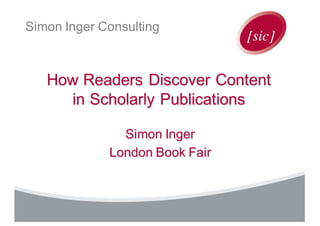Simon inger 2016 lbf presentation - how readers discover content in scholarly publications
- 1. Simon Inger Consulting How Readers Discover Content in Scholarly Publications Simon Inger London Book Fair
- 2. http://sic.pub/discover Researcher Student Librarian PublisherSite Search Engine Library Link Server Aggregator A&I Library Web Pages Peer Link Email Alert Aggregated Article Publisher’s Article Journals Navigation
- 3. http://sic.pub/discover Survey on Reader Navigation § Mission: Gain a measure of the relative importance of all of these channels to inform publishers and information buyers § Survey of Readers following on from 2005, 2008, 2012 studies § Over 40,000 respondents globally § 18 months planning, execution, analysis
- 5. http://sic.pub/discover Limitations § It’s a survey § Survey was only in English § Survey used invitations from our supporters – not necessarily completely representative sample § Due to data privacy/data protection rules, all those invited to the survey via email will be quite highly engaged with the supporter (“opted in”)
- 6. http://sic.pub/discover Headlines – lots more in the report § A&Is show decline in search importance, but still #1 in aggregate in STEM across all sectors § Academic researchers rate library discovery as high as A&Is (in high-income countries) § Academic researchers rate Google Scholar #1 § Over half of article downloads are free versions – PubMed Central a major factor § ToC alerts in decline § Increased role for social media in discovery
- 8. http://sic.pub/discover Academic researchers rate academic search engines #1
- 9. http://sic.pub/discover Wait! § Every publisher tells you that they get way more referrals from Google than Google Scholar! – Analytics typically measure last referrer, and have not tracked where navigationstarted 3 May, 2016 9 Google Google Scholar Library Link Servers Publisher’s Article 52% 48% 48% 12% 40%, or 0.04% for 1000 link servers 40%
- 10. http://sic.pub/discover But not everywhere in the world
- 11. http://sic.pub/discover Librarians are different 3 May, 2016 11
- 12. http://sic.pub/discover Largest sector difference is medical 3 May, 2016 12
- 13. http://sic.pub/discover Country differences are significant 3 May, 2016 13
- 14. http://sic.pub/discover Over half of downloads are free!
- 15. http://sic.pub/discover With some variation by country
- 16. http://sic.pub/discover PubMed Central effect 3 May, 2016 16
- 17. http://sic.pub/discover Mobile devices 3 May, 2016 17
- 18. http://sic.pub/discover Concluding observations § Many free discovery resources, like PubMed and Google Scholar, are used less in poorer countries – awareness? § Librarians aren’t convincing their patrons about search methodology § Use of mobile devices is increasing, but smartphone use remains marginal in most territories: greatest use is in low-income countries 3 May, 2016 18
- 19. Simon Inger Consulting Thank you simon@simoningerconsulting.com http://sic.pub/discover



















